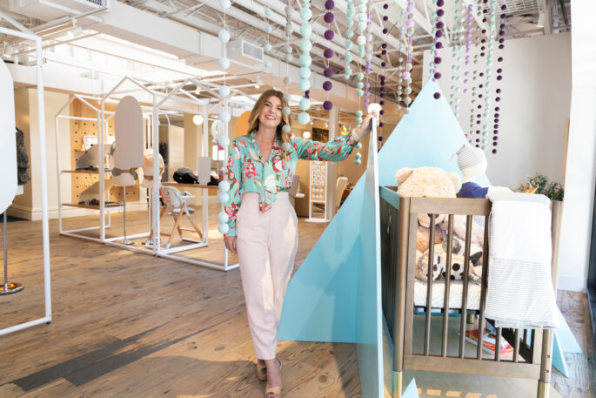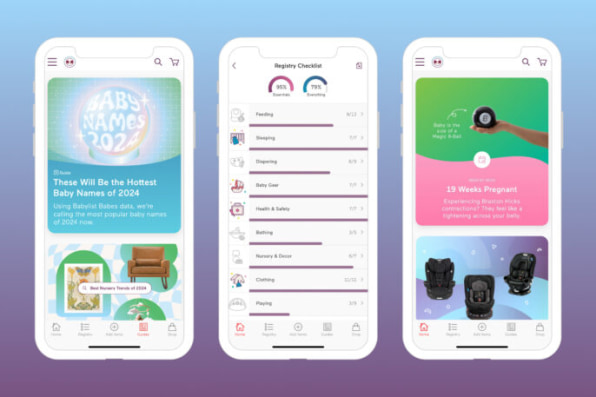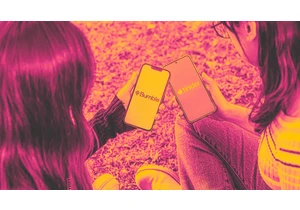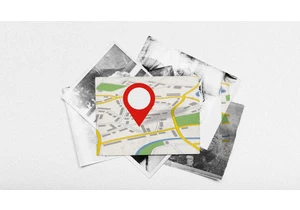Expecting parents are a retailer and marketer’s dream. There are few periods of time where customers might deviate from their ingrained habits and purchasing behaviors and try something new. One of those times is when they have a child. In 2012 journalist Charles Duhigg wrote that, to take advantage of their shifting mindset, retailers like Target are looking to identify expecting parents as early as possible and earn their trust and brand loyalty.
“[A]mong life events, none are more important than the arrival of a baby,” he wrote. “At that moment, new parents’ habits are more flexible than at almost any other time in their adult lives.”
Shortly before that article was published, a software engineer who had worked at Amazon and was pregnant with her first child was wondering where to shop online. “I was creating my own registry and planning a baby shower. I thought everyone was doing this wrong,” says Natalie Gordon. That’s how her company, Babylist, was born.

Now it’s all grown up. After bootstrapping the company for several years, Gordon has, over three funding rounds, raised about $50 million from the likes of Norwest Venture Partners and Next Play Capital. More than a million families sign up to the site each year. Last year, the 13-year-old company made more than $400 million in revenue, with gross merchandise value surpassing $1 billion.
Babylist has achieved this by tapping into that remarkably “flexible” consumer mindset of new parents and building a universe of products and services around it. Though the company was conceived as a better online baby registry, today it encompasses content, wellness services, and even physical retail.
A better Babies “R” Us
When Gordon was pregnant, physical retailers like Babies “R” Us and Buy Buy Baby still dominated baby registries. But the experience of shopping at these places could be overwhelming. Expecting parents often don’t know exactly what they want or need. Big box stores asked them to wade through shelves full of different products from a wide range of brands and all at varying prices. It was a fraught and fatiguing experience. That process has now largely moved online, with retailers like Amazon, but the decision fatigue from being presented with so many options remains.
Gordon started building a one-stop online shop where expecting and new parents could figure out what products they need and find the right ones within their budgets. “I wanted [customers] to be able to log onto the site not knowing what they need, and have the site tell them,” she says. That’s why the company has created a robust content arm full of online product guides and even videos. “You’re going to be able to watch a four- or five-minute video about a product and understand it better than if you had walked into a store,” she says.

By focusing on this content, Babylist has organically grown its user base. “We’ve expanded our audience to people who love the baby, but may not be parents,” Gordon says, citing grandparents, uncles and aunts, godparents, and more. They may first encounter the site through a registry, but will return to it for advice and gift ideas as the child grows and develops. In September, Babylist launched Wishlist, which lets families create product lists for childrens’ birthdays, holidays, and other events. More than 60,000 wish lists were created during this past holiday season.
The company is building out its resources even further. Last year, it acquired Expectful, a meditation app and content hub focused on improving mental around fertility, pregnancy, and postpartum. The app, which was designed for a younger millennial and older Gen Z audience, will host all of Babylist’s health and wellness content.
No More Baby Talk
Like wedding registry site Zola, Babylist’s initial innovation was letting users request and order items from more than one place. Both companies use drop shipping to fulfill orders, so customers no longer need to get everything from a single store. “There are always cool, direct-to-consumer sites” with great products for a registry, says Gordon. She recalls receiving a gift when she was pregnant of dog-walking services. “Having someone walk our dog every day was the best gift someone could give to us,” she says. says.
Babylist’s second big insight was to create a user experience and design that doesn’t make customers feel, well, infantilized, “In so many stores everything was pink and blue. I want to treat my users like grownups,” Gordon says.
That also means making sure it’s easy to unsubscribe when users want, especially during a sensitive time like after a miscarriage. “Traditional emails from many companies hide the unsubscribe button. We made sure it is gonna be the easiest to click. We’re not gonna use some dark patterns to keep emailing you,” Gordon says.
This attentiveness to expecting and new parents has helped the Babylist team spot new features and business opportunities. After an article from the site’s editorial team about how to get a free breast pump received a lot of engagement, the company decided to make the process of getting a pump even easier. In 2022, it launched Babylist Health, which helps users navigate insurance coverage for breast pumps. The site provides users with a list of covered breast pump options, verifies insurance coverage, and even requests breast pump prescriptions from users’ doctors. Some 10% of new customers now use the service.
The company has brought some products to market based on user feedback. The most popular is the Bottle Box, a collection of the site’s top-rated bottles that helps parents navigate the notoriously difficult, trial-and-error process of finding the right bottle for their baby. The company launched an in-house line, called Sprucely, that sells smaller items like baby hangers, drawer dividers, a car seat mirror, and a bottle brush.
Babylist is also, perhaps counterintuitively, bullish on physical retail. “Buy Buy Baby shut down in the past year. Babies “R” Us shut down in 2018,” Gordon says. “We wanted to create an experiential store, like Ikea for baby stuff, where you can use the products and then put them on your registry.” The company opened its first store, in Beverly Hills, in August, and is considering opening more.
Gordon acknowledges that the company may one day expand to help parents for older tweens and teens. But for now she wants to keep its growth slow and steady. After all . . . baby steps.
Autentifică-te pentru a adăuga comentarii
Alte posturi din acest grup

Apple, which has built its brand on data privacy, settled a class action suit this week in w

If Spotify Wrapped left you underwhelmed this year, TikTok’s “Dating Wrapped” trend is here to sp

Dating apps are gearing up for their busiest day of the year: Dating Sunday.
This landmark day in the dating world always lands on the first Sunday of January. The idea is that sin

A federal appeals court sealed the fate of the Biden administration’s efforts to regulate internet providers on Thursday, st

The new year started out with the worst kind of bang. In the early hours of January 1,

All the excitement around artificial intelligence can make it hard to notice all the other exciting progress lately that’s been the result of human intelligence.
Of course, it’s getting

When taking a trip down memory lane, some might flip through a photo album or scroll through their phone’s camera roll. But would you think to check Google Maps?
Since 2007, Google’s Str
